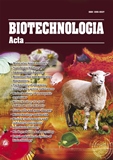ISSN 2410-7751 (Print)
ISSN 2410-776X (Online)

Biotechnologia Acta Т. 16, No. 2 , 2023
P. 44-46, Bibliography 9, Engl.
UDC: 57.022, 57.023
DOI: https://doi.org/10.15407/biotech16.02.044
Full text: (PDF, in English)
STARVATION DURING DEVELOPMENT AFFECTS METABOLISM IN DROSOPHILA
N. P. STEFANYSHYN, O. M. STRILBYTSKA , U.V. SEMANIUK, N. I. BURDYLIUK, S. V. KHARUK
Vasyl Stefanyk Precarpathian National University, Department of Biochemistry and Biotechnology, Ivano-Frankivsk, Ukraine
Aim. To investigate how starvation during early stage of fly development affects carbohydrate metabolism in imago flies and their progeny of F1 generation.
Methods. Wild-type Canton-S strain Drosophila melanogaster flies were used in all experiments. Flies of parental and offspring generations were used for the determination of glycogen and glucose content using the diagnostic kit Glucose-Mono-400-P according to the manufacturer's instructions. Results represent as the mean ± SEM of 3-4 replicates per group. According Student's t-test significant difference between groups was P<0.05. Graphing and statistical analysis were performed by using GraphPad Prism.
Results. Starvation during development significantly influenced the level of hemolymph and body glucose in imago flies of parental generation. Hemolymph glucose concentration was lower by 34% (P=0.008) and 32% (P=0.033) in experimental females and males, respectively, as compared to control groups. Starvation during development led to lower level of body glucose in adult parental flies of both sexes. Adult males F1, generated by parents that were starved during development, showed 3-fold lower glycogen content, as compared to control.
Conclusions. Starvation at early stage of development led to lower hemolymph glucose and body glucose level in imago flies. Moreover, parental starvation decreased glycogen pool in F1 males.
Key words. Drosophila, development, diet, starvation, nutrition.
© Palladin Institute of Biochemistry of the National Academy of Sciences of Ukraine, 2023
References
...1. Martin-Gronert M. S., Tarry-Adkins J. L., Cripps R. L., Chen J. H., Ozanne S. E. Maternal protein
restriction leads to early life alterations in the expression of key molecules involved in the aging process
in rat offspring. Am. J. Physiol. Regul. Integr. Comp. Physiol. 2008, 294 (2), R494–500. https://doi.
org/10.1152/ajpregu.00530.2007
2. Vaiserman A., Lushchak O. Prenatal Malnutrition-Induced Epigenetic Dysregulation as a Risk Factor
for Type 2 Diabetes. Int. J. Genomics. 2019, 3821409. https://doi.org/10.1155/2019/3821409
3. Strilbytska O. M., Semaniuk U. V., Burdyliyk N. I., Bubalo V., Lushchak O. V. Developmental diet defines
metabolic traits in larvae and adult Drosophila. The Ukr. Biochem. J. 2022, 94 (1), 53–63. https://doi.
org/10.15407/ubj94.01.053
4. Strilbytska O., Velianyk V., Burdyliuk N., Yurkevych I. S., Vaiserman A., Storey K. B. Pospisilik A.,
Lushchak O. Parental dietary protein-to-carbohydrate ratio affects offspring lifespan and metabolism
in drosophila. Comp. Biochem. Physiol. A Mol. Integr. Physiol. 2020, 241, 110622. https://doi.
org/10.1016/j.cbpa.2019.110622
5. Vaiserman A., Lushchak O. Developmental origins of type 2 diabetes: Focus on epigenetics. Ageing Res
Rev. 2019, 55, 100957. https://doi.org/10.1016/j.arr.2019.100957


